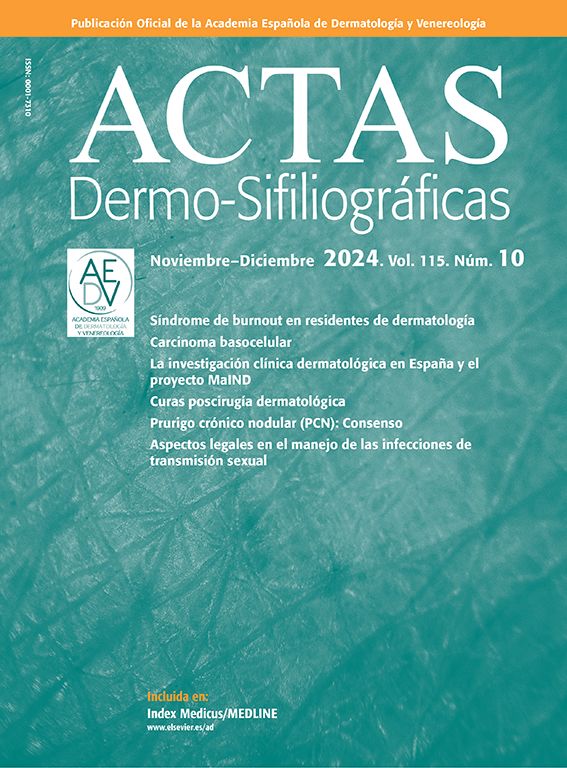A 35-year-old woman from Ecuador whose history was remarkable for osteosarcoma in infancy (currently in remission) came to our department for assessment of progressive growth of a lesion on her right leg. The lesion had been present for at least 5 years. The patient also reported having had verrucous lesions on her hands and feet since adolescence (Fig. 1). The examination revealed poikiloderma-type skin in sun-exposed areas (face, neck, and limbs), with areas of atrophic skin, depigmentation, and lentiginous pigmentation (Figs. 2 and 3). She reported having had these skin problems since birth. The lesion on the right leg was removed. Histopathology confirmed a diagnosis of Bowen disease. Given her history of osteosarcoma during infancy, poikiloderma-type skin abnormalities, verrucous lesions, and skin cancer at such an early age, we made a presumptive diagnosis of Rothmund-Thomson syndrome (RTS). This diagnosis was confirmed by a genetic study, which revealed a homozygous variant in the RECQL4 gene, namely, c.3236G>T (p.S1079I). This mutation had not been previously reported in the literature, although the change that occurred (sense change in the last nucleotide of exon 19 of the RECQL4 gene) makes it very likely that this was a pathogenic mutation. Furthermore, the Human Gene Mutation Database contains missense variants in adjacent regions associated with RTS. It was not possible to perform a genetic analysis of the patient's parents (nonconsanguineous), since they lived in Ecuador.
RTS (OMIM#268400) is a rare autosomal recessive genetic skin disease characterized by erythematous plaques and patches (occasionally edematous and bullous lesions) that appear during childhood on sun-exposed areas, mainly on the cheeks and limbs. Over the years, the lesions atrophy, with telangiectasia and areas of lentiginous depigmentation and pigmentation. Other findings include short stature, hair loss (scalp, eyebrows, and eyelashes), skeletal abnormalities, juvenile cataracts, hypogonadism, gastrointestinal disorders, and susceptibility to malignant diseases (mainly osteosarcoma and skin cancer).1–4
Two types of RTS have been reported. Type I disease (35–40% of cases) is characterized by poikiloderma, ectodermal dysplasia, and juvenile cataracts. Type II disease (60–65%), on the other hand, is characterized by the additional presence of poikiloderma, congenital bone defects, and an increased risk of osteosarcoma (reported in 30% of patients with RTS).5 Type II RTS is associated with heterozygous or homozygous mutations in the DNA helicase gene RECQL4.1,2 Some 400 cases of RTS have been reported to date.
We highlight the importance of suspecting RTS in children with poikiloderma-like abnormalities. This approach will facilitate the early diagnosis of other, potentially severe associations, such as malignant disease. In middle-aged persons, as in the case we report, a history of osteosarcoma, together with the presence of skin abnormalities, should alert us to the possibility of RTS.
Conflicts of InterestThe authors declare that they have no conflicts of interest.











